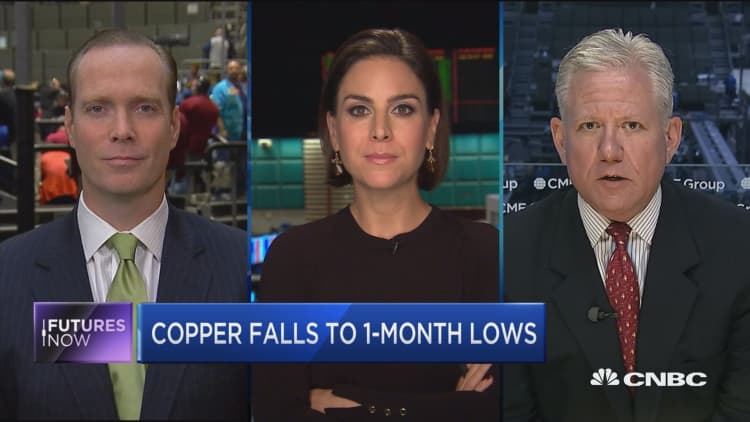
With copper prices down over 50 percent from 2011 peaks, and the metal's reputation as a harbinger for the health of the economy, is there a U.S. recession on the horizon?
Not according to Wells Fargo, which said in a recent note that it was "not convinced that copper deserves a MD (doctor of medicine) but that it deserves a PhD in economics" instead.
Three-month copper on the London Metal Exchange is trading around $4,650 a metric ton, which is 0.8 percent lower year-to-date but 10 percent lower from a year ago. And Goldman Sachs forecast recently that the metal would see some significant price pressures in the coming months due to a "wall of supply".
Prices of most commodities have been under pressure since the summer of 2014 due to the crash in oil prices on a supply glut and as concerns over the economic slowdown in China weigh.
Copper's weakness should, in theory, signal bad news for the economy; the metal is called Dr. Copper because it is used in so many industrial applications that its price is often cited as an indicator of economic health.
But Wells Fargo said that tracking historical data showed copper had helped to predict only three out of five U.S. recessions since 1980. Copper price declines came ahead of the downturns in 1981, 2001 and 2007, while missing those in 1980 and 1990, Wells Fargo's real asset strategy head, John LaForge, wrote.
"While this is not a bad record, we are not convinced that a 60 percent success rate deserves the coveted medical designation, MD. Maybe a more appropriate designation would be a PhD in economics - as copper's great predictability is more theory than fact (no offense to the fine PhD economists out there)," LaForge added.
However, copper prices were still a better recession-predictor than the U.S. National Bureau of Economic Research, the official "caller" of U.S. recessions, he added, noting that the bureau was "relatively late to the party" for all of the past five recessions.
"By the time the NBER had declared each of these past recessions, the recessions were well on their way to being over. Versus the NBER, Dr Copper does look like a genius."

